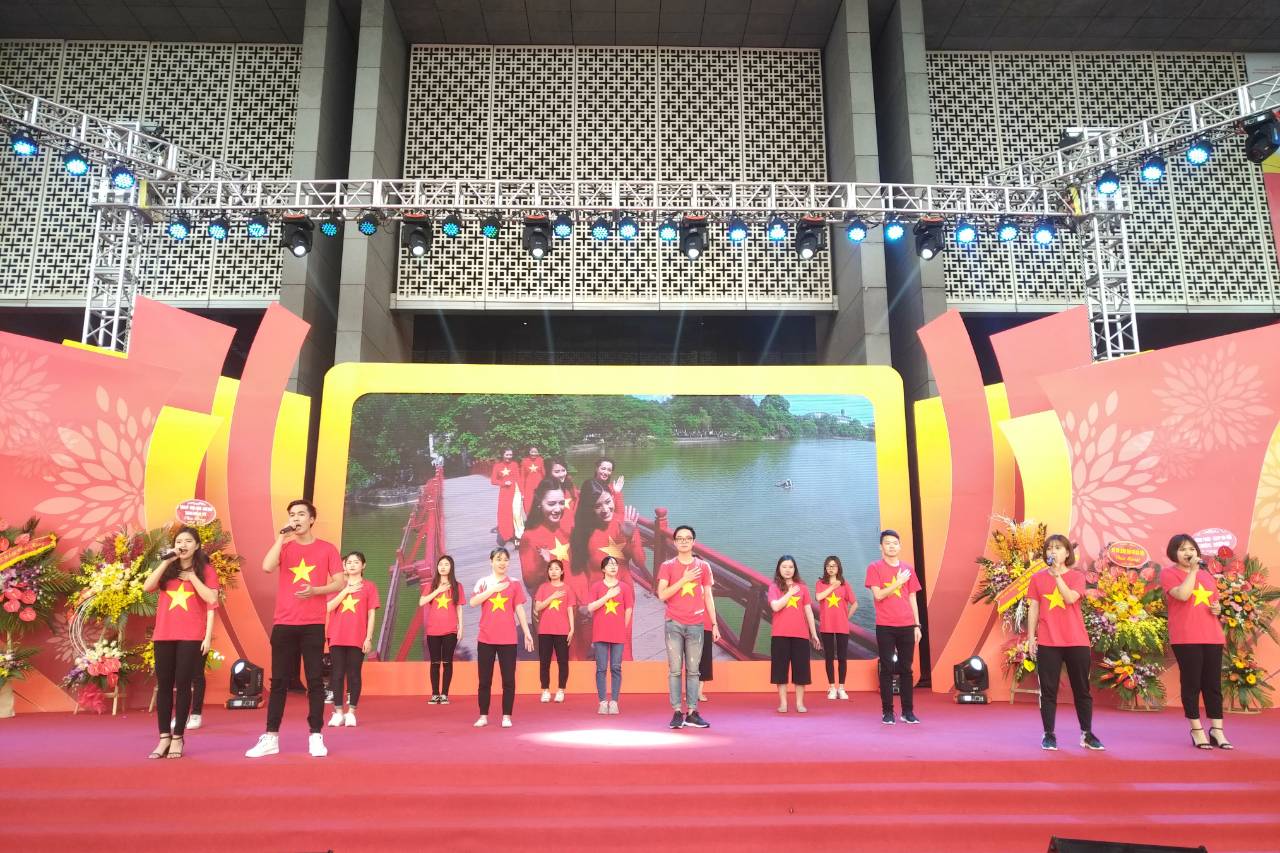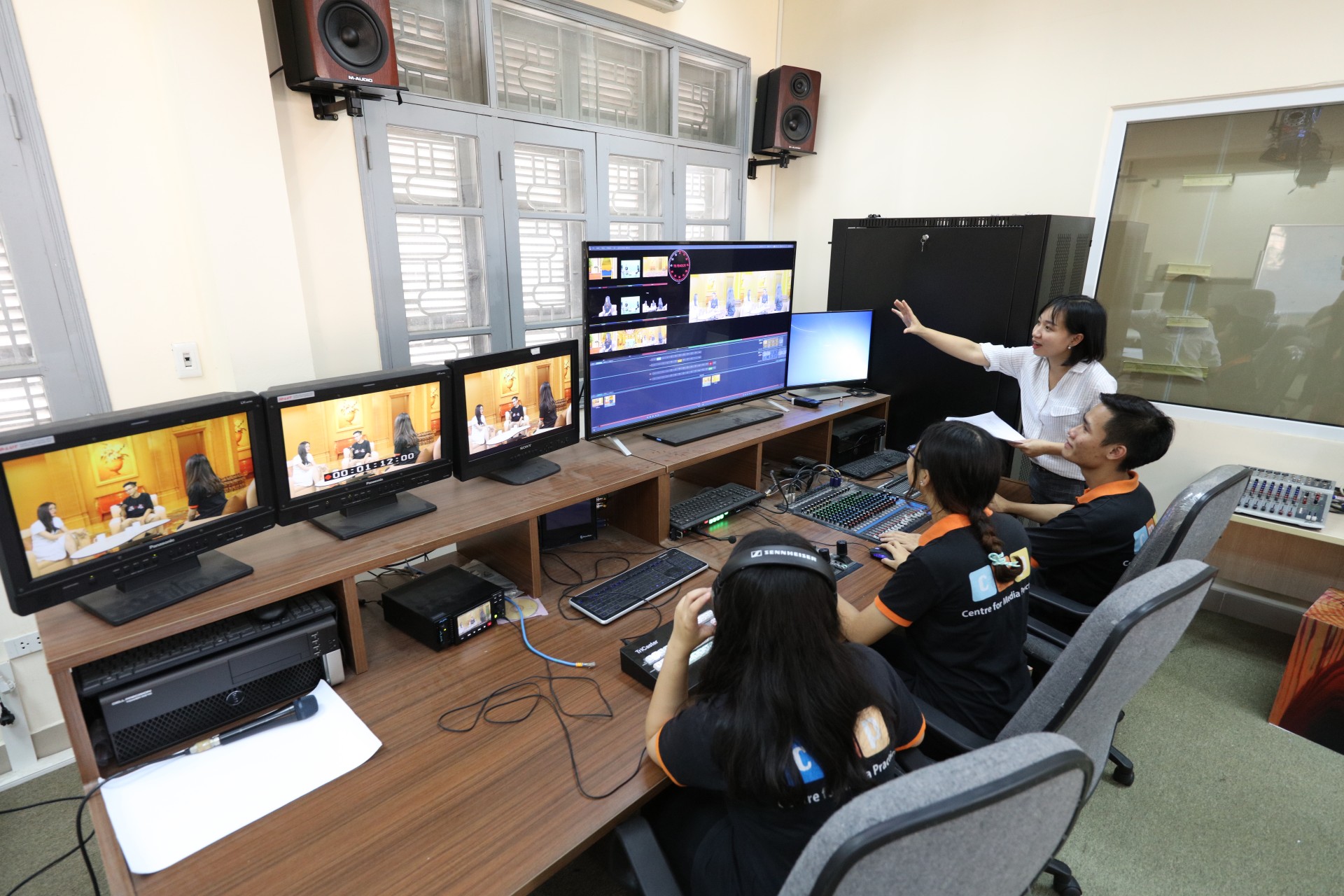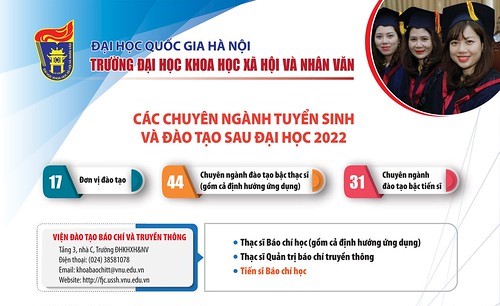The technological revolution is transforming the traditional media ecosystem of the industrial age into a new ecosystem of digital media - the age of intellectual civilization. Digital society is taking shape with 'digital generation' citizens - those who not only receive information, but also interact multi-dimensionally and create content on digital platforms, to perform a more important function: participating in socio-political activities. Modern technology brings many opportunities, but also poses many challenges for journalists, and journalism trainers.
Journalism training - specialized, interdisciplinary and transdisciplinary training
Lecturers and students of the Institute of Journalism and Communication in a practical class
The emergence of new technology - digital technology is directly affecting the operation, production and distribution of news of press agencies. Modern newspapers around the world take advantage of AI (artificial intelligence) to help readers quickly search and select news that suits them. More precisely, newsrooms use AI to analyze past reader behavior to produce articles that best match their interests and concerns. AI has been and is being used to detect breaking news, verify information, interact with readers, moderate comments, produce videos, and even write news and articles automatically. Many newsrooms use Robots instead of journalists to produce media products, especially news, quickly and accurately.

With a team of professional lecturers, most of whom are well-trained in the UK, France, Australia, Korea, Russia, etc. (of which 65% are PhDs and 25% are Associate Professors), the Institute of Journalism and Communication (University of Social Sciences and Humanities) is offering 3 undergraduate training programs: Journalism, High-Quality Journalism, and Public Relations. In the near future, the Institute will have an additional bachelor's training program in Digital Media & Communications. In addition to the research-oriented Master's program in Journalism, the Institute has developed the application-oriented Master's program in Journalism, and especially the Master's program in Journalism and Communication Management, attracting a large number of students.
Studying in the leading training and research environment of social sciences and humanities in Vietnam, students are exposed to and imparted the most basic, fundamental and profound knowledge of philosophy, history, literature, linguistics, psychology, sociology, etc. These are important and valuable knowledge bases that help future journalists write many articles that touch people's hearts with cultural depth and comprehensive social understanding.
With the flexible mechanism of the credit-based training method, students can study for a double degree to receive 2 regular bachelor's degrees after 4.5 - 5 years of studying at school. Studying journalism combined with another social science major not only supplements interdisciplinary knowledge, increases job opportunities for students, but also creates journalists - experts in a specific field (such as journalists specializing in writing about economics, environment, education, international, ...). Reporters and editors who are good at their job and have a deep understanding of a field will create high-quality articles about industries and fields, and thereby increase the political - scientific - educational content of Vietnamese journalism.
 Students of the Institute of Journalism and Communication perform at the National Press Festival
Students of the Institute of Journalism and Communication perform at the National Press FestivalTraining political courage and journalistic ethics in the context of social media communication
In recent years, our Party has paid special attention to controlling power. At the 11th Congress, the Party introduced a new content into the principles of organization and operation of the state apparatus, which is the control between agencies in the implementation of legislative, executive and judicial powers.
In the 2013 Constitution, the principle of organizing state power was stipulated, and a mechanism for controlling state power was added. The issue of controlling power continues to be one of the important contents of the 13th Congress with the determination to "Complete and strictly implement the mechanism for controlling power, preventing abuse of power and violations of discipline and order".
The press plays an important role in the fight against corruption, negativity, and in monitoring and controlling power. In the Resolution of the 6th Central Committee (second time) of the 8th term (February 1999), our Party affirmed that public opinion is one of the four social monitoring systems. At the 11th Congress, the Communist Party of Vietnam once again affirmed: "Focus on improving the ideological nature, strongly promoting the information, education, organization and social criticism functions of the mass media for the benefit of the people and the country"... This is an important step in the development of the Party's theory and awareness of the social role of the press and mass media.

Lecturers and students of the Institute of Journalism and Communication at the Workshop "Journalism in the Covid-19 Era"
Looking straight at the truth and correctly assessing the truth is the concretization of the press's function of monitoring and controlling power.
The pressure on journalists is to have fast, hot news. However, press information must be accurate and must depict the nature of the truth. This requires journalists to have professional qualifications and work seriously.
Journalism is a special profession, because the information that journalists provide has a great influence on the public and contributes significantly to creating public opinion. The press is the messenger, the bridge between the public and policy makers. And democracy can only be achieved when people have full, accurate, and objective information, helping them to speak up and make the right decisions.
The press has a particularly important role, so right from its inception in the 17th century, there have been conventions of journalistic ethics. All world press have written conventions approved by professional congresses, and are recognized when journalists practice their profession. Many press agencies have even built their own set of ethical conventions, such as the BBC (UK), or the New York Times (USA). The conventions of journalistic ethics are very diverse and rich, but they all have one thing in common, which is to acknowledge objectivity, truthfulness, fairness and balance in information as the highest ethical standards of journalists.
In the digital age, journalistic ethics need to be promoted and enforced more effectively than ever. Therefore, training in journalism and media requires not only skills and expertise, but also comprehensive training, especially in political ideology and professional ethics, and general knowledge about culture and society for journalists.Four hundred years ago, the British philosopher F. Bacon once said: “Knowledge is power”, “Whoever controls information controls the world”. In his work “The Coming of Post-Industrial Society”, Daniel Bell said: “Industrial society is based on mechanical technology, post-industrial society is based on intellectual technology. If capital and labor are two characteristics of industrial society, then information and knowledge are two characteristics that replace them in post-industrial society. Post-industrial society is also called information society”.
Information has become one of the five important factors of the economy, along with: human resources, raw materials, technology and capital. The amount of information and the speed of information transmission represent the strength of a country, and the development of information society is an inevitable trend of modern society. Therefore, for a long time, journalism has become a thriving industry in many countries and journalism training has always been a field that attracts a large number of students.
University of Social Sciences and Humanities - VNU announces the second round of postgraduate enrollment in 2022 with 44 master's majors and 31 doctoral majors.
- Register online at: http://tssdh.vnu.edu.vn.Registration time: from May 16, 2022 to August 30, 2022.
- Submit application directly or by post to the address: Training Department, University of Social Sciences and Humanities, 336 Nguyen Trai, Thanh Xuan Trung Ward, Thanh Xuan District, Hanoi, latestbefore 5:00 p.m. on August 30, 2022).
- Admissions organization:in September 2022
- Support phone:(024) 3858.3957-Zalo: 0912.708.840(before 9:00 p.m.)
- Admission website:http://tuyensinh.ussh.edu.vn; - Fanpage:https://www.facebook.com/tuyensinhsdh.USSH
- Contact email:tuyensinhsdh@ussh.edu.vn
|




